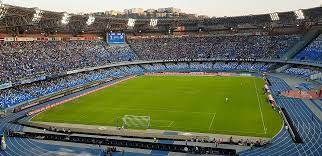July 31 – Serie A champions Napoli have formally signalled their intent to leave the historic Stadio Diego Armando Maradona behind, declaring it unfit for modern international competition and laying the groundwork for a brand-new stadium.
The decision follows recent meetings between club officials, UEFA, the Italian Football Federation (FIGC), and local authorities, as part of discussions around Italy’s preparations to co-host Euro 2032 with Turkey.
Naples had hoped to be part of the host city lineup, but the club has now made clear that the current stadium – despite its deep cultural and sporting legacy – is no longer viable for a tournament of this scale.
UEFA reiterated its baseline requirements for EURO venues, placing emphasis on structural standards and cooperation between clubs and local government. But Napoli did not mince words. In an official statement, the club said: “After two years of studies paid for by the club, we excluded the compatibility of investment at the Maradona… even the city council’s proposed renovations would not meet modern standards.”
Originally opened in 1959 and host to five matches during the 1990 World Cup, the 54,726-seat stadium is Italy’s fourth-largest. But time has taken its toll, and UEFA’s evaluation reportedly lacked optimism.
Napoli now plan to go it alone. The club says it will invest its own resources to build a new stadium from scratch, and has already earmarked a “degraded area” of the city as a potential site — one that could benefit from a significant urban renewal boost as part of the wider project. While the exact location remains under wraps, sources suggest the site is large enough to meet UEFA’s requirements and accommodate modern infrastructure.
If realised, the move would mark a clean break from the club’s past — and the stadium synonymous with both Diego Maradona and Napoli’s iconic rise. But with the ambition to host Euro 2032 matches and bring top-tier facilities to Naples, the club appears ready to build for the future — even if it means leaving a piece of football history behind.
Contact the writer of this story, Harry Ewing, at moc.l1754071965labto1754071965ofdlr1754071965owedi1754071965sni@g1754071965niwe.1754071965yrrah1754071965
